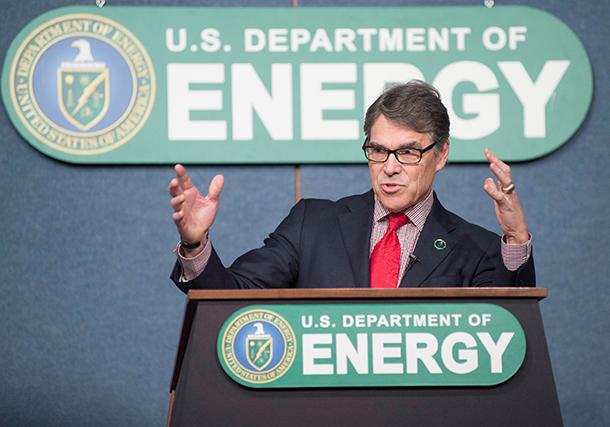How do you lead a government agency you once said should be abolished?
Former Texas Gov. Rick Perry was sworn in as the Department of Energy Secretary on March 2.
Former Texas Gov. Rick Perry is the new US energy secretary. It’s an ironic choice: During his 2012 presidential bid, Perry said the Energy Department could easily be abolished — and some observers have suggested Perry didn’t actually understand the job he was taking when it was offered to him.
Unlike most prior energy secretaries, Perry has no background in science. Kevin Knobloch, chief of staff for Ernest Moniz, Perry’s predecessor at the Department of Energy, understands why this worries many people, but he believes being a scientist is not essential to the job. What is essential, he says, is that the secretary put experienced, highly regarded scientists in key roles.
“When Secretary Moniz headed the department, Lynn Orr, a subsurface-expert scientist, was the undersecretary for Science and Energy; esteemed scientist Cherry Murray was head of the Office of Science, and so on,” Knobloch says. “So, if the energy secretary is himself or herself not a scientist, it's very critical that capable scientists and technologists are put into those other roles.”
If there is one thing Perry’s appointment has revealed, it's that the public doesn’t fully understand the mission of the Department of Energy. What exactly does this department do?
“First and foremost, DOE is responsible for our nuclear weapons arsenal — building them, maintaining them and dismantling them when a treaty like the New START treaty with the Russians comes into force,” explains Knobloch. “The department is also responsible for 17 national laboratories, which represent probably the single, largest annual investment in basic science and research and development in the physical sciences in the world, certainly in the country.”
In addition, DOE has programs like ARPA-E (Advanced Research Projects Agency-Energy) — designed after DARPA (Defense Advanced Research Projects Agency) in the Defense Department — to support emerging technologies and help them reach commercialization; a loan program supporting advanced clean energy technology that has a $30 billion portfolio; and the department runs the cleanup program of the radioactive waste from the Cold War weapons program, which is a $6 billion a year investment to fulfill US commitment to communities that hosted these facilities during the Cold War.
The Department of Energy also was key in the negotiations with Iran to stop them in their move toward nuclear weapons and helps negotiate global nuclear nonproliferation agreements. Knobloch says nuclear security remains a critical national security issue.
“It's a very serious need for this new administration to focus on nonproliferation, on nuclear security,” Knobloch says. “One of the great achievements of the Obama administration — and the Department of Energy was central to this — was working with countries around the world to secure their weapons-grade uranium and plutonium. We locked up a lot of that material, which, in some instances, was vulnerable to falling into the wrong hands. Clearly, having succeeded with Iran, the remaining very major threat is North Korea.”
Perry is known primarily as a booster of the oil and gas industries, but during his multiple terms as governor ofTexas, the state built a lot of wind power.
“It is now the state with the largest installed wind capacity in the country, and that was on his watch,” Knobloch says. “So, I suspect he has a strong appreciation of the fact that wind power not only has added a zero carbon energy source to his state and the national energy mix, but it's producing a lot of jobs.”
Even though Perry declared that, as president, he would eliminate the Energy Department, Knobloch believes that, at this point, he “really needs to be assessed on the merits and on what he does in the role, not what he has said in the past.”
“He did say at his confirmation hearing that he regrets having called for the elimination of the Department of Energy, that he now does not associate himself with that position, because, he said, he had received extensive briefings on the mission and responsibilities of the department and is convinced that it is essential to the US economy and US national security,” Knobloch points out. “That's a positive, and I think we need to see what he does as secretary.”
This article is based on an interview that aired on PRI’s Living on Earth with Steve Curwood.
Every day, reporters and producers at The World are hard at work bringing you human-centered news from across the globe. But we can’t do it without you. We need your support to ensure we can continue this work for another year.
Make a gift today, and you’ll help us unlock a matching gift of $67,000!
